Teacher's Reflective Report: Indigenous Australian Education
VerifiedAdded on 2023/06/18
|6
|1314
|460
Report
AI Summary
This report critically reflects on Indigenous education in Australia from a teacher's perspective, analyzing an article advocating for Indigenous voices in education. It examines pre-existing knowledge, presumptions, and perceptions of Indigenous people, highlighting the impacts of historical policies and the importance of maximizing educational opportunities. The report discusses factors influencing school attendance, the linkage between social disadvantages and educational achievement, and the enduring gaps between Indigenous and non-Indigenous Australians. It also addresses the perception of Indigenous education as inferior and the barriers faced by Indigenous students, such as inappropriate teaching materials and language barriers. The report concludes that poverty and social issues among urban Indigenous people are linked to a lack of educational qualifications, emphasizing the need for improved educational services and community support. Desklib offers similar solved assignments and past papers for students.
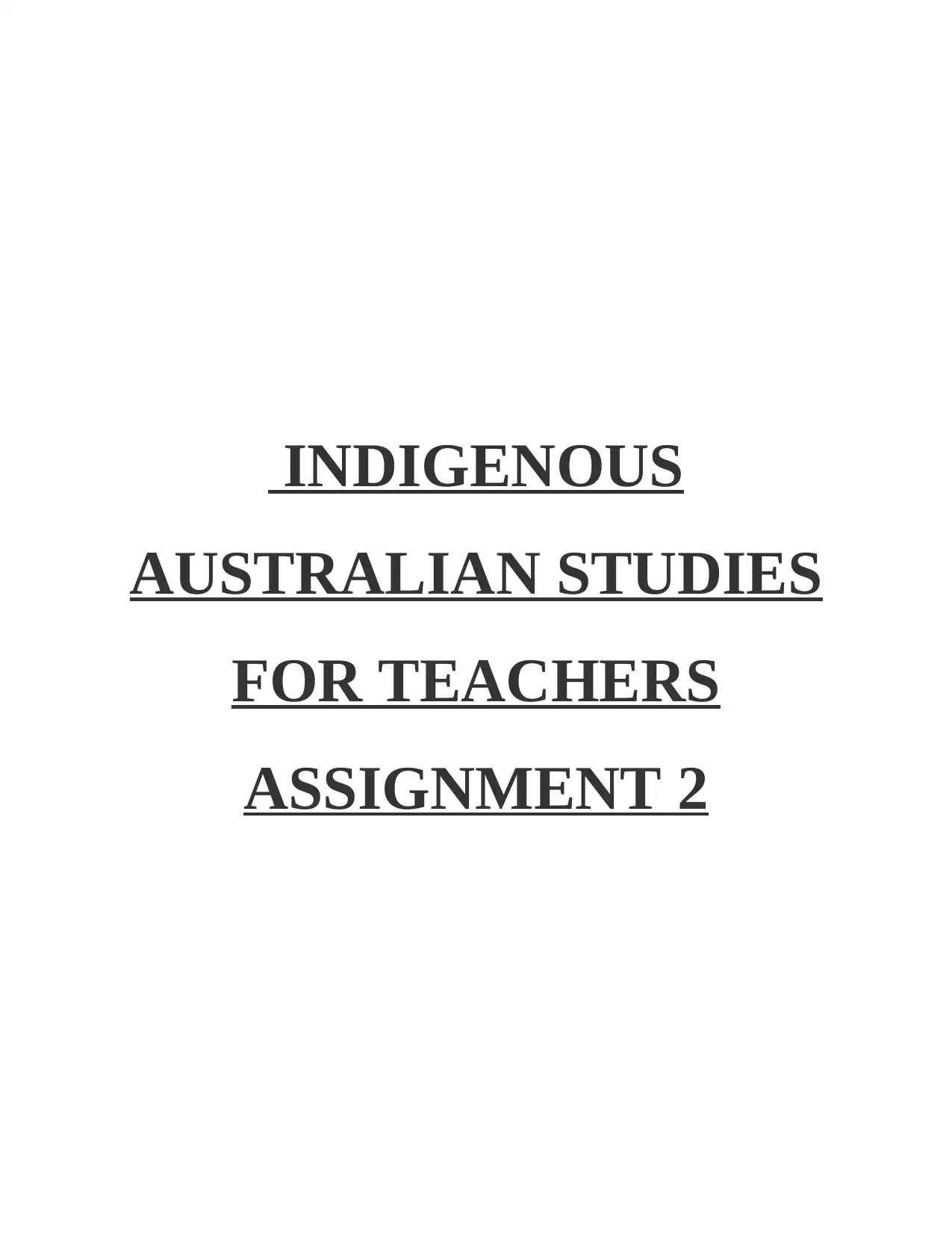
INDIGENOUS
AUSTRALIAN STUDIES
FOR TEACHERS
ASSIGNMENT 2
AUSTRALIAN STUDIES
FOR TEACHERS
ASSIGNMENT 2
Paraphrase This Document
Need a fresh take? Get an instant paraphrase of this document with our AI Paraphraser
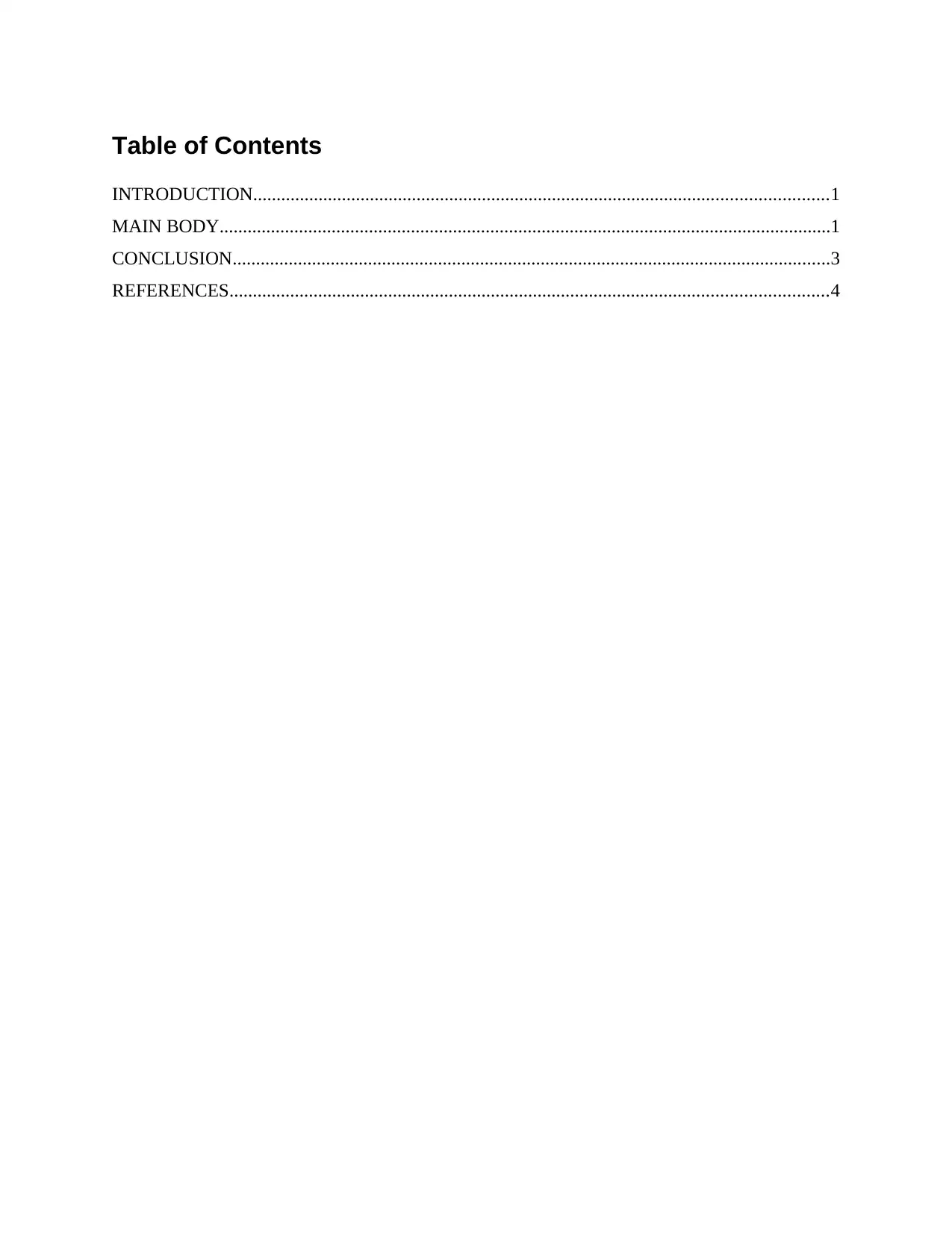
Table of Contents
INTRODUCTION...........................................................................................................................1
MAIN BODY...................................................................................................................................1
CONCLUSION................................................................................................................................3
REFERENCES................................................................................................................................4
INTRODUCTION...........................................................................................................................1
MAIN BODY...................................................................................................................................1
CONCLUSION................................................................................................................................3
REFERENCES................................................................................................................................4
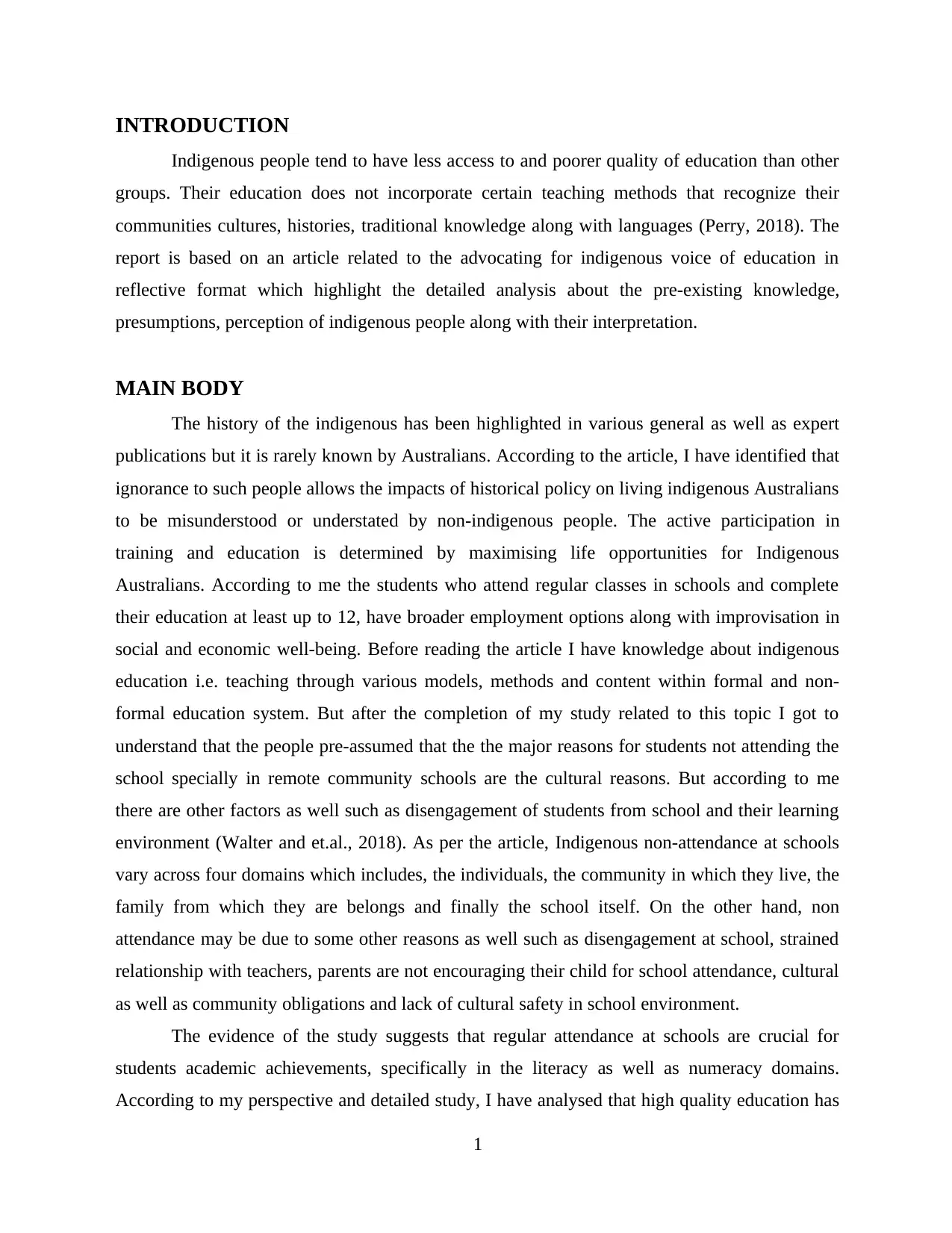
INTRODUCTION
Indigenous people tend to have less access to and poorer quality of education than other
groups. Their education does not incorporate certain teaching methods that recognize their
communities cultures, histories, traditional knowledge along with languages (Perry, 2018). The
report is based on an article related to the advocating for indigenous voice of education in
reflective format which highlight the detailed analysis about the pre-existing knowledge,
presumptions, perception of indigenous people along with their interpretation.
MAIN BODY
The history of the indigenous has been highlighted in various general as well as expert
publications but it is rarely known by Australians. According to the article, I have identified that
ignorance to such people allows the impacts of historical policy on living indigenous Australians
to be misunderstood or understated by non-indigenous people. The active participation in
training and education is determined by maximising life opportunities for Indigenous
Australians. According to me the students who attend regular classes in schools and complete
their education at least up to 12, have broader employment options along with improvisation in
social and economic well-being. Before reading the article I have knowledge about indigenous
education i.e. teaching through various models, methods and content within formal and non-
formal education system. But after the completion of my study related to this topic I got to
understand that the people pre-assumed that the the major reasons for students not attending the
school specially in remote community schools are the cultural reasons. But according to me
there are other factors as well such as disengagement of students from school and their learning
environment (Walter and et.al., 2018). As per the article, Indigenous non-attendance at schools
vary across four domains which includes, the individuals, the community in which they live, the
family from which they are belongs and finally the school itself. On the other hand, non
attendance may be due to some other reasons as well such as disengagement at school, strained
relationship with teachers, parents are not encouraging their child for school attendance, cultural
as well as community obligations and lack of cultural safety in school environment.
The evidence of the study suggests that regular attendance at schools are crucial for
students academic achievements, specifically in the literacy as well as numeracy domains.
According to my perspective and detailed study, I have analysed that high quality education has
1
Indigenous people tend to have less access to and poorer quality of education than other
groups. Their education does not incorporate certain teaching methods that recognize their
communities cultures, histories, traditional knowledge along with languages (Perry, 2018). The
report is based on an article related to the advocating for indigenous voice of education in
reflective format which highlight the detailed analysis about the pre-existing knowledge,
presumptions, perception of indigenous people along with their interpretation.
MAIN BODY
The history of the indigenous has been highlighted in various general as well as expert
publications but it is rarely known by Australians. According to the article, I have identified that
ignorance to such people allows the impacts of historical policy on living indigenous Australians
to be misunderstood or understated by non-indigenous people. The active participation in
training and education is determined by maximising life opportunities for Indigenous
Australians. According to me the students who attend regular classes in schools and complete
their education at least up to 12, have broader employment options along with improvisation in
social and economic well-being. Before reading the article I have knowledge about indigenous
education i.e. teaching through various models, methods and content within formal and non-
formal education system. But after the completion of my study related to this topic I got to
understand that the people pre-assumed that the the major reasons for students not attending the
school specially in remote community schools are the cultural reasons. But according to me
there are other factors as well such as disengagement of students from school and their learning
environment (Walter and et.al., 2018). As per the article, Indigenous non-attendance at schools
vary across four domains which includes, the individuals, the community in which they live, the
family from which they are belongs and finally the school itself. On the other hand, non
attendance may be due to some other reasons as well such as disengagement at school, strained
relationship with teachers, parents are not encouraging their child for school attendance, cultural
as well as community obligations and lack of cultural safety in school environment.
The evidence of the study suggests that regular attendance at schools are crucial for
students academic achievements, specifically in the literacy as well as numeracy domains.
According to my perspective and detailed study, I have analysed that high quality education has
1
⊘ This is a preview!⊘
Do you want full access?
Subscribe today to unlock all pages.

Trusted by 1+ million students worldwide
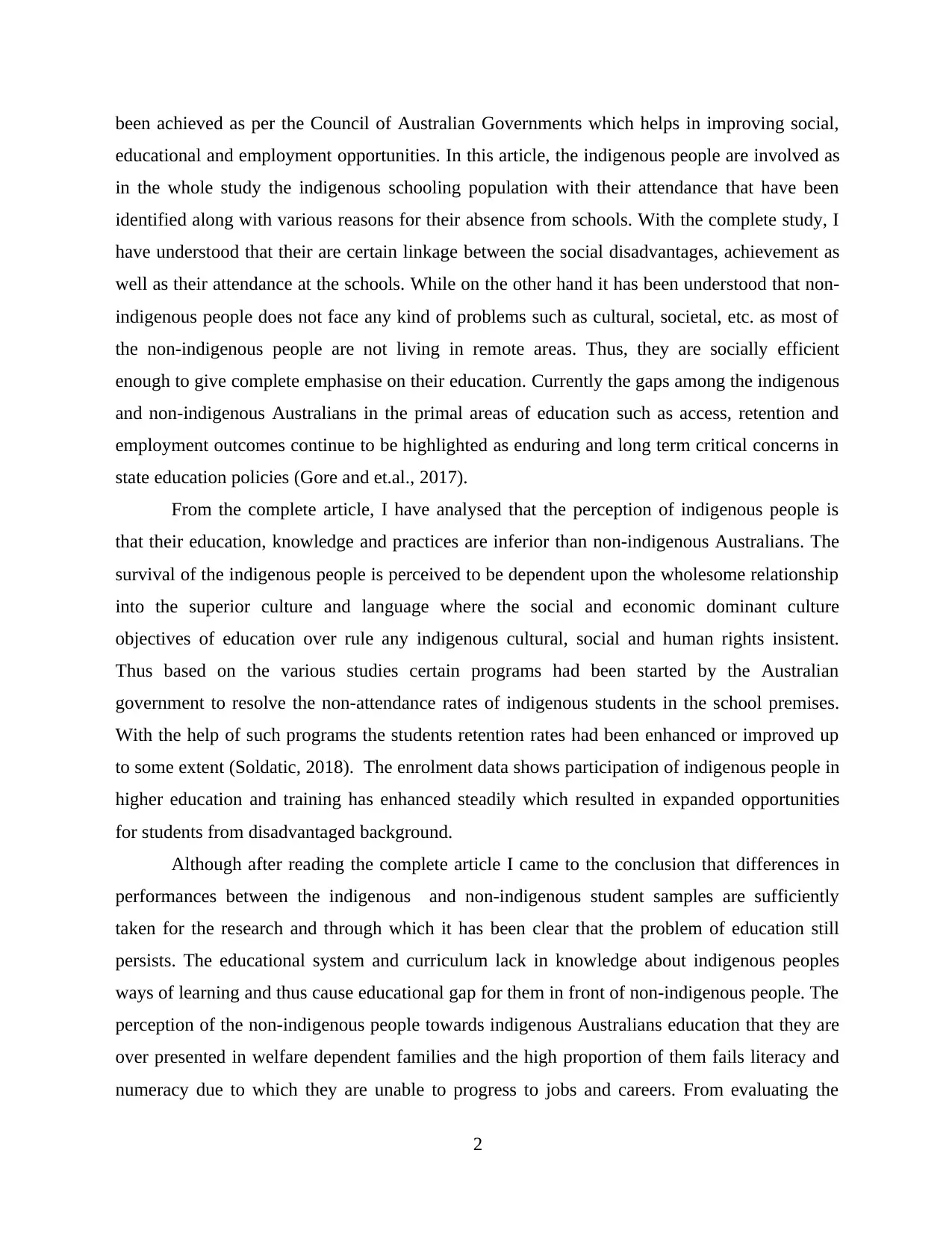
been achieved as per the Council of Australian Governments which helps in improving social,
educational and employment opportunities. In this article, the indigenous people are involved as
in the whole study the indigenous schooling population with their attendance that have been
identified along with various reasons for their absence from schools. With the complete study, I
have understood that their are certain linkage between the social disadvantages, achievement as
well as their attendance at the schools. While on the other hand it has been understood that non-
indigenous people does not face any kind of problems such as cultural, societal, etc. as most of
the non-indigenous people are not living in remote areas. Thus, they are socially efficient
enough to give complete emphasise on their education. Currently the gaps among the indigenous
and non-indigenous Australians in the primal areas of education such as access, retention and
employment outcomes continue to be highlighted as enduring and long term critical concerns in
state education policies (Gore and et.al., 2017).
From the complete article, I have analysed that the perception of indigenous people is
that their education, knowledge and practices are inferior than non-indigenous Australians. The
survival of the indigenous people is perceived to be dependent upon the wholesome relationship
into the superior culture and language where the social and economic dominant culture
objectives of education over rule any indigenous cultural, social and human rights insistent.
Thus based on the various studies certain programs had been started by the Australian
government to resolve the non-attendance rates of indigenous students in the school premises.
With the help of such programs the students retention rates had been enhanced or improved up
to some extent (Soldatic, 2018). The enrolment data shows participation of indigenous people in
higher education and training has enhanced steadily which resulted in expanded opportunities
for students from disadvantaged background.
Although after reading the complete article I came to the conclusion that differences in
performances between the indigenous and non-indigenous student samples are sufficiently
taken for the research and through which it has been clear that the problem of education still
persists. The educational system and curriculum lack in knowledge about indigenous peoples
ways of learning and thus cause educational gap for them in front of non-indigenous people. The
perception of the non-indigenous people towards indigenous Australians education that they are
over presented in welfare dependent families and the high proportion of them fails literacy and
numeracy due to which they are unable to progress to jobs and careers. From evaluating the
2
educational and employment opportunities. In this article, the indigenous people are involved as
in the whole study the indigenous schooling population with their attendance that have been
identified along with various reasons for their absence from schools. With the complete study, I
have understood that their are certain linkage between the social disadvantages, achievement as
well as their attendance at the schools. While on the other hand it has been understood that non-
indigenous people does not face any kind of problems such as cultural, societal, etc. as most of
the non-indigenous people are not living in remote areas. Thus, they are socially efficient
enough to give complete emphasise on their education. Currently the gaps among the indigenous
and non-indigenous Australians in the primal areas of education such as access, retention and
employment outcomes continue to be highlighted as enduring and long term critical concerns in
state education policies (Gore and et.al., 2017).
From the complete article, I have analysed that the perception of indigenous people is
that their education, knowledge and practices are inferior than non-indigenous Australians. The
survival of the indigenous people is perceived to be dependent upon the wholesome relationship
into the superior culture and language where the social and economic dominant culture
objectives of education over rule any indigenous cultural, social and human rights insistent.
Thus based on the various studies certain programs had been started by the Australian
government to resolve the non-attendance rates of indigenous students in the school premises.
With the help of such programs the students retention rates had been enhanced or improved up
to some extent (Soldatic, 2018). The enrolment data shows participation of indigenous people in
higher education and training has enhanced steadily which resulted in expanded opportunities
for students from disadvantaged background.
Although after reading the complete article I came to the conclusion that differences in
performances between the indigenous and non-indigenous student samples are sufficiently
taken for the research and through which it has been clear that the problem of education still
persists. The educational system and curriculum lack in knowledge about indigenous peoples
ways of learning and thus cause educational gap for them in front of non-indigenous people. The
perception of the non-indigenous people towards indigenous Australians education that they are
over presented in welfare dependent families and the high proportion of them fails literacy and
numeracy due to which they are unable to progress to jobs and careers. From evaluating the
2
Paraphrase This Document
Need a fresh take? Get an instant paraphrase of this document with our AI Paraphraser
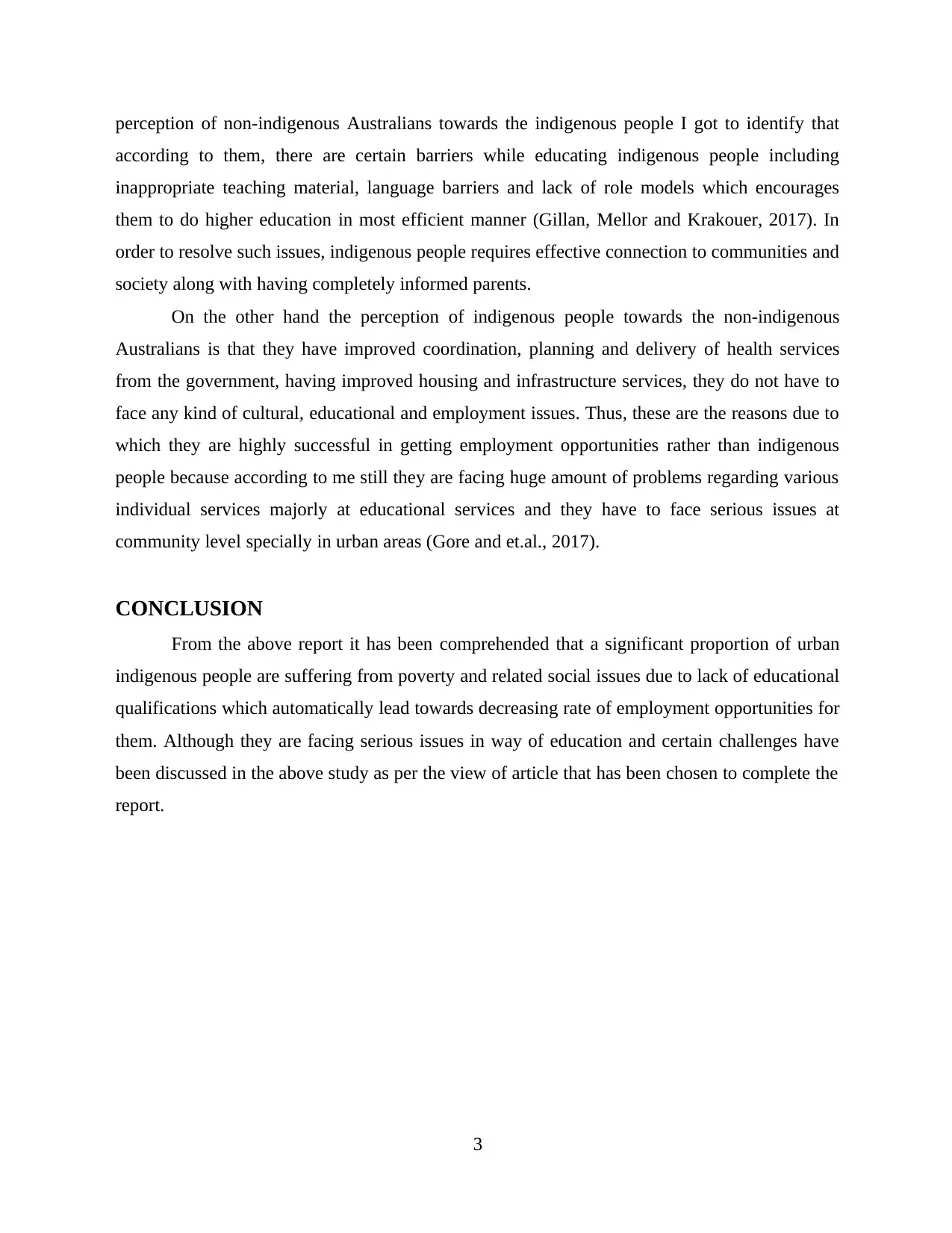
perception of non-indigenous Australians towards the indigenous people I got to identify that
according to them, there are certain barriers while educating indigenous people including
inappropriate teaching material, language barriers and lack of role models which encourages
them to do higher education in most efficient manner (Gillan, Mellor and Krakouer, 2017). In
order to resolve such issues, indigenous people requires effective connection to communities and
society along with having completely informed parents.
On the other hand the perception of indigenous people towards the non-indigenous
Australians is that they have improved coordination, planning and delivery of health services
from the government, having improved housing and infrastructure services, they do not have to
face any kind of cultural, educational and employment issues. Thus, these are the reasons due to
which they are highly successful in getting employment opportunities rather than indigenous
people because according to me still they are facing huge amount of problems regarding various
individual services majorly at educational services and they have to face serious issues at
community level specially in urban areas (Gore and et.al., 2017).
CONCLUSION
From the above report it has been comprehended that a significant proportion of urban
indigenous people are suffering from poverty and related social issues due to lack of educational
qualifications which automatically lead towards decreasing rate of employment opportunities for
them. Although they are facing serious issues in way of education and certain challenges have
been discussed in the above study as per the view of article that has been chosen to complete the
report.
3
according to them, there are certain barriers while educating indigenous people including
inappropriate teaching material, language barriers and lack of role models which encourages
them to do higher education in most efficient manner (Gillan, Mellor and Krakouer, 2017). In
order to resolve such issues, indigenous people requires effective connection to communities and
society along with having completely informed parents.
On the other hand the perception of indigenous people towards the non-indigenous
Australians is that they have improved coordination, planning and delivery of health services
from the government, having improved housing and infrastructure services, they do not have to
face any kind of cultural, educational and employment issues. Thus, these are the reasons due to
which they are highly successful in getting employment opportunities rather than indigenous
people because according to me still they are facing huge amount of problems regarding various
individual services majorly at educational services and they have to face serious issues at
community level specially in urban areas (Gore and et.al., 2017).
CONCLUSION
From the above report it has been comprehended that a significant proportion of urban
indigenous people are suffering from poverty and related social issues due to lack of educational
qualifications which automatically lead towards decreasing rate of employment opportunities for
them. Although they are facing serious issues in way of education and certain challenges have
been discussed in the above study as per the view of article that has been chosen to complete the
report.
3
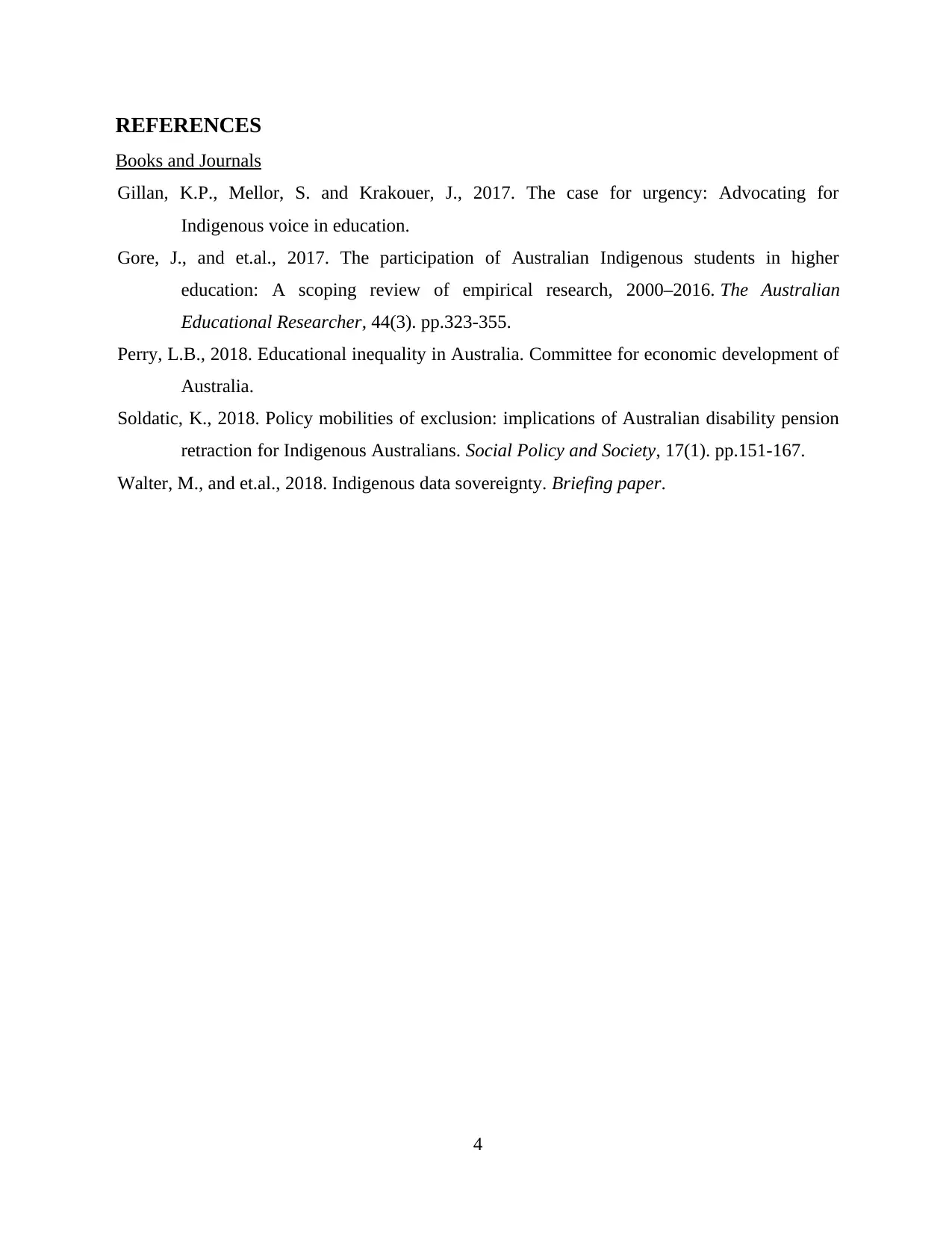
REFERENCES
Books and Journals
Gillan, K.P., Mellor, S. and Krakouer, J., 2017. The case for urgency: Advocating for
Indigenous voice in education.
Gore, J., and et.al., 2017. The participation of Australian Indigenous students in higher
education: A scoping review of empirical research, 2000–2016. The Australian
Educational Researcher, 44(3). pp.323-355.
Perry, L.B., 2018. Educational inequality in Australia. Committee for economic development of
Australia.
Soldatic, K., 2018. Policy mobilities of exclusion: implications of Australian disability pension
retraction for Indigenous Australians. Social Policy and Society, 17(1). pp.151-167.
Walter, M., and et.al., 2018. Indigenous data sovereignty. Briefing paper.
4
Books and Journals
Gillan, K.P., Mellor, S. and Krakouer, J., 2017. The case for urgency: Advocating for
Indigenous voice in education.
Gore, J., and et.al., 2017. The participation of Australian Indigenous students in higher
education: A scoping review of empirical research, 2000–2016. The Australian
Educational Researcher, 44(3). pp.323-355.
Perry, L.B., 2018. Educational inequality in Australia. Committee for economic development of
Australia.
Soldatic, K., 2018. Policy mobilities of exclusion: implications of Australian disability pension
retraction for Indigenous Australians. Social Policy and Society, 17(1). pp.151-167.
Walter, M., and et.al., 2018. Indigenous data sovereignty. Briefing paper.
4
⊘ This is a preview!⊘
Do you want full access?
Subscribe today to unlock all pages.

Trusted by 1+ million students worldwide
1 out of 6
Related Documents
Your All-in-One AI-Powered Toolkit for Academic Success.
+13062052269
info@desklib.com
Available 24*7 on WhatsApp / Email
![[object Object]](/_next/static/media/star-bottom.7253800d.svg)
Unlock your academic potential
Copyright © 2020–2025 A2Z Services. All Rights Reserved. Developed and managed by ZUCOL.





